Leadership Reflection: Case Study and Gibbs' Reflective Cycle
VerifiedAdded on 2022/10/08
|9
|3032
|13
Report
AI Summary
This report presents a reflective essay analyzing a case study focusing on nursing leadership. It uses Gibbs' Reflective Cycle to examine factors impacting nursing leaders, clinical leadership expectations for new graduate nurses, and strategies for developing personal and professional resilience. The essay explores RN Standards of Practice, emphasizing communication, collaboration, and self-care. The analysis includes a discussion on the importance of knowledge, self-management, and effective communication in nursing practice. The report also outlines an action plan for enhancing personal and professional resilience through self-management skills, knowledge acquisition, and networking with experienced nurse leaders. The conclusion highlights the supportive elements that experienced nursing leaders can offer to newly graduated nurses and emphasizes the importance of leadership skills for effective teamwork and patient care.
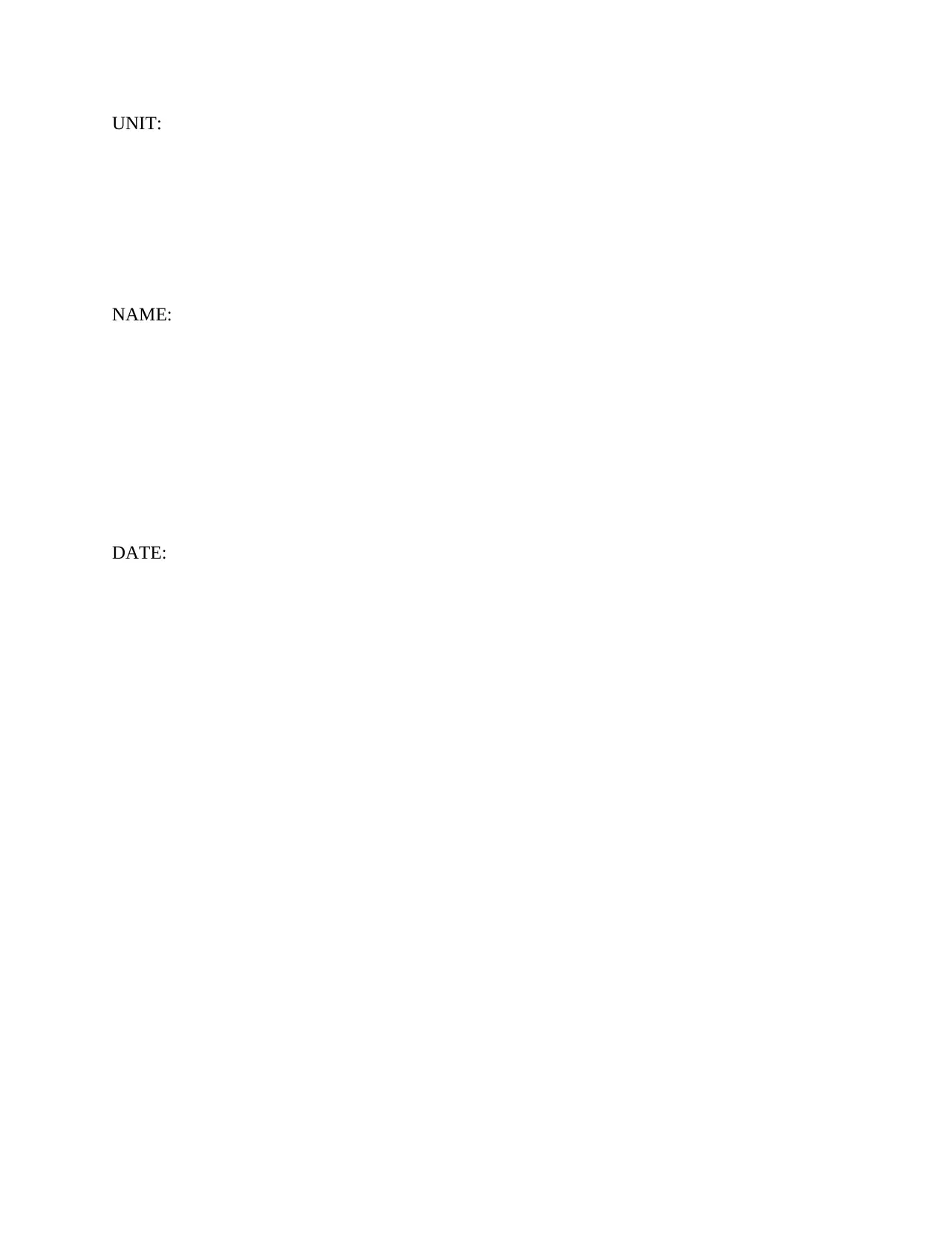
UNIT:
NAME:
DATE:
NAME:
DATE:
Paraphrase This Document
Need a fresh take? Get an instant paraphrase of this document with our AI Paraphraser
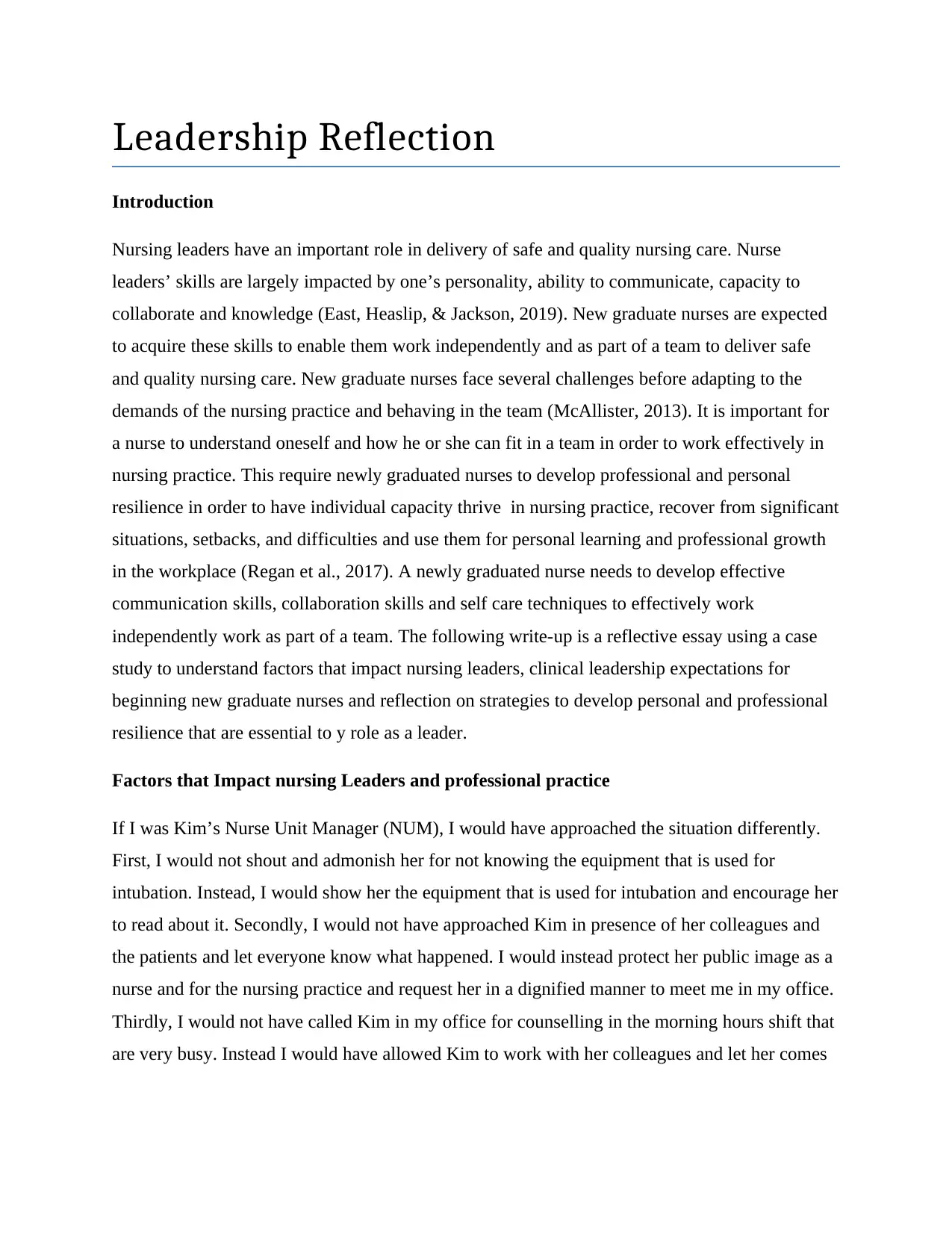
Leadership Reflection
Introduction
Nursing leaders have an important role in delivery of safe and quality nursing care. Nurse
leaders’ skills are largely impacted by one’s personality, ability to communicate, capacity to
collaborate and knowledge (East, Heaslip, & Jackson, 2019). New graduate nurses are expected
to acquire these skills to enable them work independently and as part of a team to deliver safe
and quality nursing care. New graduate nurses face several challenges before adapting to the
demands of the nursing practice and behaving in the team (McAllister, 2013). It is important for
a nurse to understand oneself and how he or she can fit in a team in order to work effectively in
nursing practice. This require newly graduated nurses to develop professional and personal
resilience in order to have individual capacity thrive in nursing practice, recover from significant
situations, setbacks, and difficulties and use them for personal learning and professional growth
in the workplace (Regan et al., 2017). A newly graduated nurse needs to develop effective
communication skills, collaboration skills and self care techniques to effectively work
independently work as part of a team. The following write-up is a reflective essay using a case
study to understand factors that impact nursing leaders, clinical leadership expectations for
beginning new graduate nurses and reflection on strategies to develop personal and professional
resilience that are essential to y role as a leader.
Factors that Impact nursing Leaders and professional practice
If I was Kim’s Nurse Unit Manager (NUM), I would have approached the situation differently.
First, I would not shout and admonish her for not knowing the equipment that is used for
intubation. Instead, I would show her the equipment that is used for intubation and encourage her
to read about it. Secondly, I would not have approached Kim in presence of her colleagues and
the patients and let everyone know what happened. I would instead protect her public image as a
nurse and for the nursing practice and request her in a dignified manner to meet me in my office.
Thirdly, I would not have called Kim in my office for counselling in the morning hours shift that
are very busy. Instead I would have allowed Kim to work with her colleagues and let her comes
Introduction
Nursing leaders have an important role in delivery of safe and quality nursing care. Nurse
leaders’ skills are largely impacted by one’s personality, ability to communicate, capacity to
collaborate and knowledge (East, Heaslip, & Jackson, 2019). New graduate nurses are expected
to acquire these skills to enable them work independently and as part of a team to deliver safe
and quality nursing care. New graduate nurses face several challenges before adapting to the
demands of the nursing practice and behaving in the team (McAllister, 2013). It is important for
a nurse to understand oneself and how he or she can fit in a team in order to work effectively in
nursing practice. This require newly graduated nurses to develop professional and personal
resilience in order to have individual capacity thrive in nursing practice, recover from significant
situations, setbacks, and difficulties and use them for personal learning and professional growth
in the workplace (Regan et al., 2017). A newly graduated nurse needs to develop effective
communication skills, collaboration skills and self care techniques to effectively work
independently work as part of a team. The following write-up is a reflective essay using a case
study to understand factors that impact nursing leaders, clinical leadership expectations for
beginning new graduate nurses and reflection on strategies to develop personal and professional
resilience that are essential to y role as a leader.
Factors that Impact nursing Leaders and professional practice
If I was Kim’s Nurse Unit Manager (NUM), I would have approached the situation differently.
First, I would not shout and admonish her for not knowing the equipment that is used for
intubation. Instead, I would show her the equipment that is used for intubation and encourage her
to read about it. Secondly, I would not have approached Kim in presence of her colleagues and
the patients and let everyone know what happened. I would instead protect her public image as a
nurse and for the nursing practice and request her in a dignified manner to meet me in my office.
Thirdly, I would not have called Kim in my office for counselling in the morning hours shift that
are very busy. Instead I would have allowed Kim to work with her colleagues and let her comes
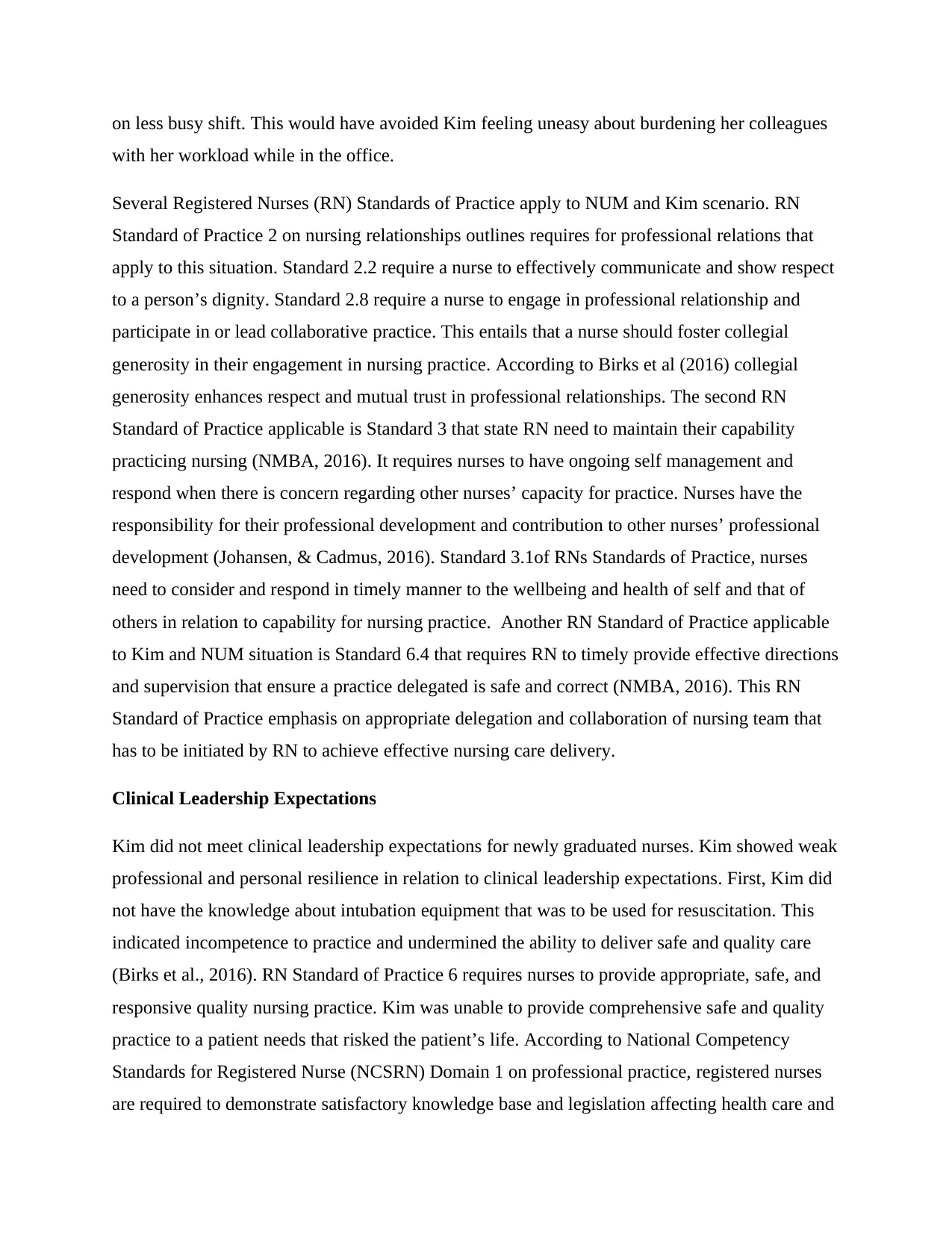
on less busy shift. This would have avoided Kim feeling uneasy about burdening her colleagues
with her workload while in the office.
Several Registered Nurses (RN) Standards of Practice apply to NUM and Kim scenario. RN
Standard of Practice 2 on nursing relationships outlines requires for professional relations that
apply to this situation. Standard 2.2 require a nurse to effectively communicate and show respect
to a person’s dignity. Standard 2.8 require a nurse to engage in professional relationship and
participate in or lead collaborative practice. This entails that a nurse should foster collegial
generosity in their engagement in nursing practice. According to Birks et al (2016) collegial
generosity enhances respect and mutual trust in professional relationships. The second RN
Standard of Practice applicable is Standard 3 that state RN need to maintain their capability
practicing nursing (NMBA, 2016). It requires nurses to have ongoing self management and
respond when there is concern regarding other nurses’ capacity for practice. Nurses have the
responsibility for their professional development and contribution to other nurses’ professional
development (Johansen, & Cadmus, 2016). Standard 3.1of RNs Standards of Practice, nurses
need to consider and respond in timely manner to the wellbeing and health of self and that of
others in relation to capability for nursing practice. Another RN Standard of Practice applicable
to Kim and NUM situation is Standard 6.4 that requires RN to timely provide effective directions
and supervision that ensure a practice delegated is safe and correct (NMBA, 2016). This RN
Standard of Practice emphasis on appropriate delegation and collaboration of nursing team that
has to be initiated by RN to achieve effective nursing care delivery.
Clinical Leadership Expectations
Kim did not meet clinical leadership expectations for newly graduated nurses. Kim showed weak
professional and personal resilience in relation to clinical leadership expectations. First, Kim did
not have the knowledge about intubation equipment that was to be used for resuscitation. This
indicated incompetence to practice and undermined the ability to deliver safe and quality care
(Birks et al., 2016). RN Standard of Practice 6 requires nurses to provide appropriate, safe, and
responsive quality nursing practice. Kim was unable to provide comprehensive safe and quality
practice to a patient needs that risked the patient’s life. According to National Competency
Standards for Registered Nurse (NCSRN) Domain 1 on professional practice, registered nurses
are required to demonstrate satisfactory knowledge base and legislation affecting health care and
with her workload while in the office.
Several Registered Nurses (RN) Standards of Practice apply to NUM and Kim scenario. RN
Standard of Practice 2 on nursing relationships outlines requires for professional relations that
apply to this situation. Standard 2.2 require a nurse to effectively communicate and show respect
to a person’s dignity. Standard 2.8 require a nurse to engage in professional relationship and
participate in or lead collaborative practice. This entails that a nurse should foster collegial
generosity in their engagement in nursing practice. According to Birks et al (2016) collegial
generosity enhances respect and mutual trust in professional relationships. The second RN
Standard of Practice applicable is Standard 3 that state RN need to maintain their capability
practicing nursing (NMBA, 2016). It requires nurses to have ongoing self management and
respond when there is concern regarding other nurses’ capacity for practice. Nurses have the
responsibility for their professional development and contribution to other nurses’ professional
development (Johansen, & Cadmus, 2016). Standard 3.1of RNs Standards of Practice, nurses
need to consider and respond in timely manner to the wellbeing and health of self and that of
others in relation to capability for nursing practice. Another RN Standard of Practice applicable
to Kim and NUM situation is Standard 6.4 that requires RN to timely provide effective directions
and supervision that ensure a practice delegated is safe and correct (NMBA, 2016). This RN
Standard of Practice emphasis on appropriate delegation and collaboration of nursing team that
has to be initiated by RN to achieve effective nursing care delivery.
Clinical Leadership Expectations
Kim did not meet clinical leadership expectations for newly graduated nurses. Kim showed weak
professional and personal resilience in relation to clinical leadership expectations. First, Kim did
not have the knowledge about intubation equipment that was to be used for resuscitation. This
indicated incompetence to practice and undermined the ability to deliver safe and quality care
(Birks et al., 2016). RN Standard of Practice 6 requires nurses to provide appropriate, safe, and
responsive quality nursing practice. Kim was unable to provide comprehensive safe and quality
practice to a patient needs that risked the patient’s life. According to National Competency
Standards for Registered Nurse (NCSRN) Domain 1 on professional practice, registered nurses
are required to demonstrate satisfactory knowledge base and legislation affecting health care and
⊘ This is a preview!⊘
Do you want full access?
Subscribe today to unlock all pages.

Trusted by 1+ million students worldwide
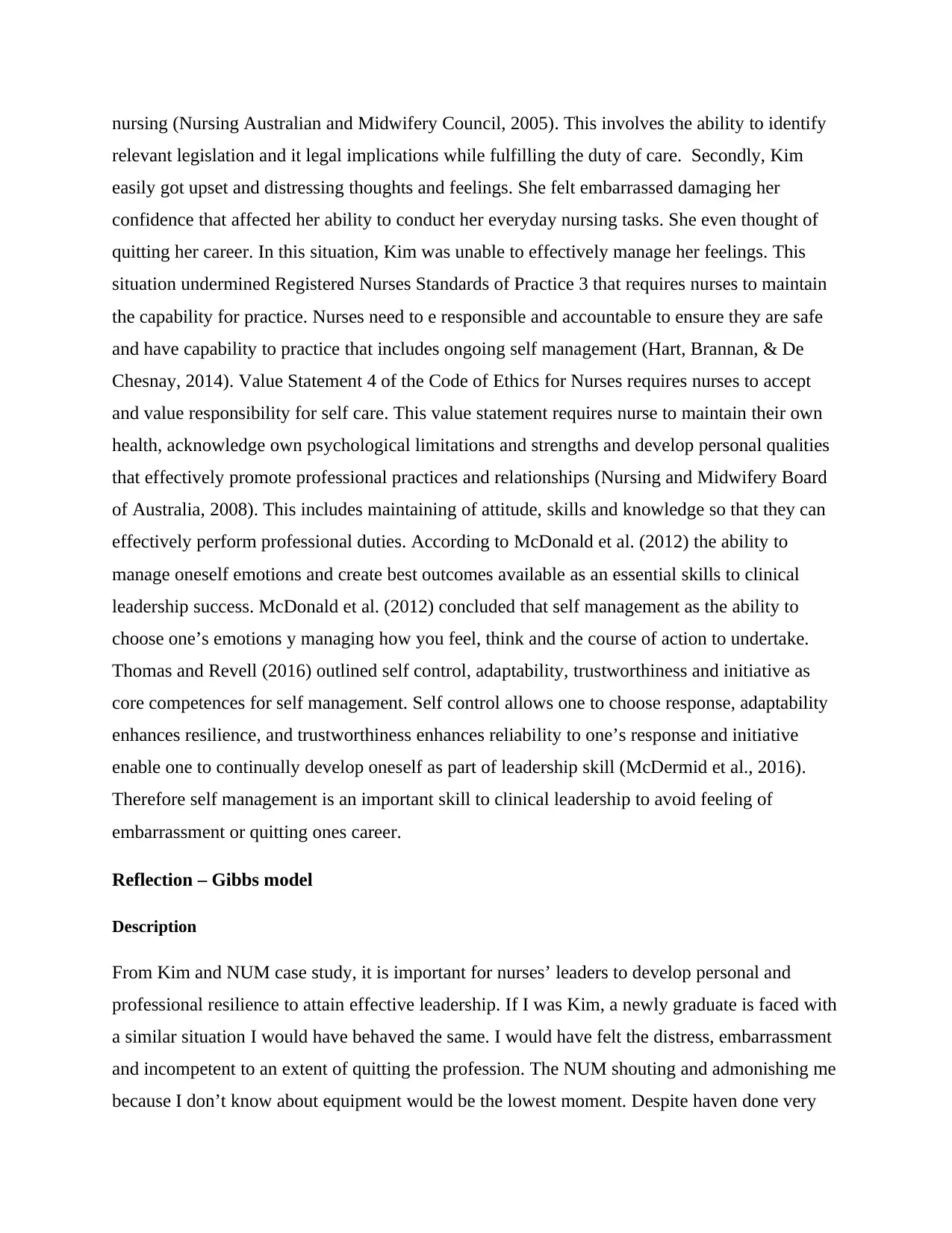
nursing (Nursing Australian and Midwifery Council, 2005). This involves the ability to identify
relevant legislation and it legal implications while fulfilling the duty of care. Secondly, Kim
easily got upset and distressing thoughts and feelings. She felt embarrassed damaging her
confidence that affected her ability to conduct her everyday nursing tasks. She even thought of
quitting her career. In this situation, Kim was unable to effectively manage her feelings. This
situation undermined Registered Nurses Standards of Practice 3 that requires nurses to maintain
the capability for practice. Nurses need to e responsible and accountable to ensure they are safe
and have capability to practice that includes ongoing self management (Hart, Brannan, & De
Chesnay, 2014). Value Statement 4 of the Code of Ethics for Nurses requires nurses to accept
and value responsibility for self care. This value statement requires nurse to maintain their own
health, acknowledge own psychological limitations and strengths and develop personal qualities
that effectively promote professional practices and relationships (Nursing and Midwifery Board
of Australia, 2008). This includes maintaining of attitude, skills and knowledge so that they can
effectively perform professional duties. According to McDonald et al. (2012) the ability to
manage oneself emotions and create best outcomes available as an essential skills to clinical
leadership success. McDonald et al. (2012) concluded that self management as the ability to
choose one’s emotions y managing how you feel, think and the course of action to undertake.
Thomas and Revell (2016) outlined self control, adaptability, trustworthiness and initiative as
core competences for self management. Self control allows one to choose response, adaptability
enhances resilience, and trustworthiness enhances reliability to one’s response and initiative
enable one to continually develop oneself as part of leadership skill (McDermid et al., 2016).
Therefore self management is an important skill to clinical leadership to avoid feeling of
embarrassment or quitting ones career.
Reflection – Gibbs model
Description
From Kim and NUM case study, it is important for nurses’ leaders to develop personal and
professional resilience to attain effective leadership. If I was Kim, a newly graduate is faced with
a similar situation I would have behaved the same. I would have felt the distress, embarrassment
and incompetent to an extent of quitting the profession. The NUM shouting and admonishing me
because I don’t know about equipment would be the lowest moment. Despite haven done very
relevant legislation and it legal implications while fulfilling the duty of care. Secondly, Kim
easily got upset and distressing thoughts and feelings. She felt embarrassed damaging her
confidence that affected her ability to conduct her everyday nursing tasks. She even thought of
quitting her career. In this situation, Kim was unable to effectively manage her feelings. This
situation undermined Registered Nurses Standards of Practice 3 that requires nurses to maintain
the capability for practice. Nurses need to e responsible and accountable to ensure they are safe
and have capability to practice that includes ongoing self management (Hart, Brannan, & De
Chesnay, 2014). Value Statement 4 of the Code of Ethics for Nurses requires nurses to accept
and value responsibility for self care. This value statement requires nurse to maintain their own
health, acknowledge own psychological limitations and strengths and develop personal qualities
that effectively promote professional practices and relationships (Nursing and Midwifery Board
of Australia, 2008). This includes maintaining of attitude, skills and knowledge so that they can
effectively perform professional duties. According to McDonald et al. (2012) the ability to
manage oneself emotions and create best outcomes available as an essential skills to clinical
leadership success. McDonald et al. (2012) concluded that self management as the ability to
choose one’s emotions y managing how you feel, think and the course of action to undertake.
Thomas and Revell (2016) outlined self control, adaptability, trustworthiness and initiative as
core competences for self management. Self control allows one to choose response, adaptability
enhances resilience, and trustworthiness enhances reliability to one’s response and initiative
enable one to continually develop oneself as part of leadership skill (McDermid et al., 2016).
Therefore self management is an important skill to clinical leadership to avoid feeling of
embarrassment or quitting ones career.
Reflection – Gibbs model
Description
From Kim and NUM case study, it is important for nurses’ leaders to develop personal and
professional resilience to attain effective leadership. If I was Kim, a newly graduate is faced with
a similar situation I would have behaved the same. I would have felt the distress, embarrassment
and incompetent to an extent of quitting the profession. The NUM shouting and admonishing me
because I don’t know about equipment would be the lowest moment. Despite haven done very
Paraphrase This Document
Need a fresh take? Get an instant paraphrase of this document with our AI Paraphraser
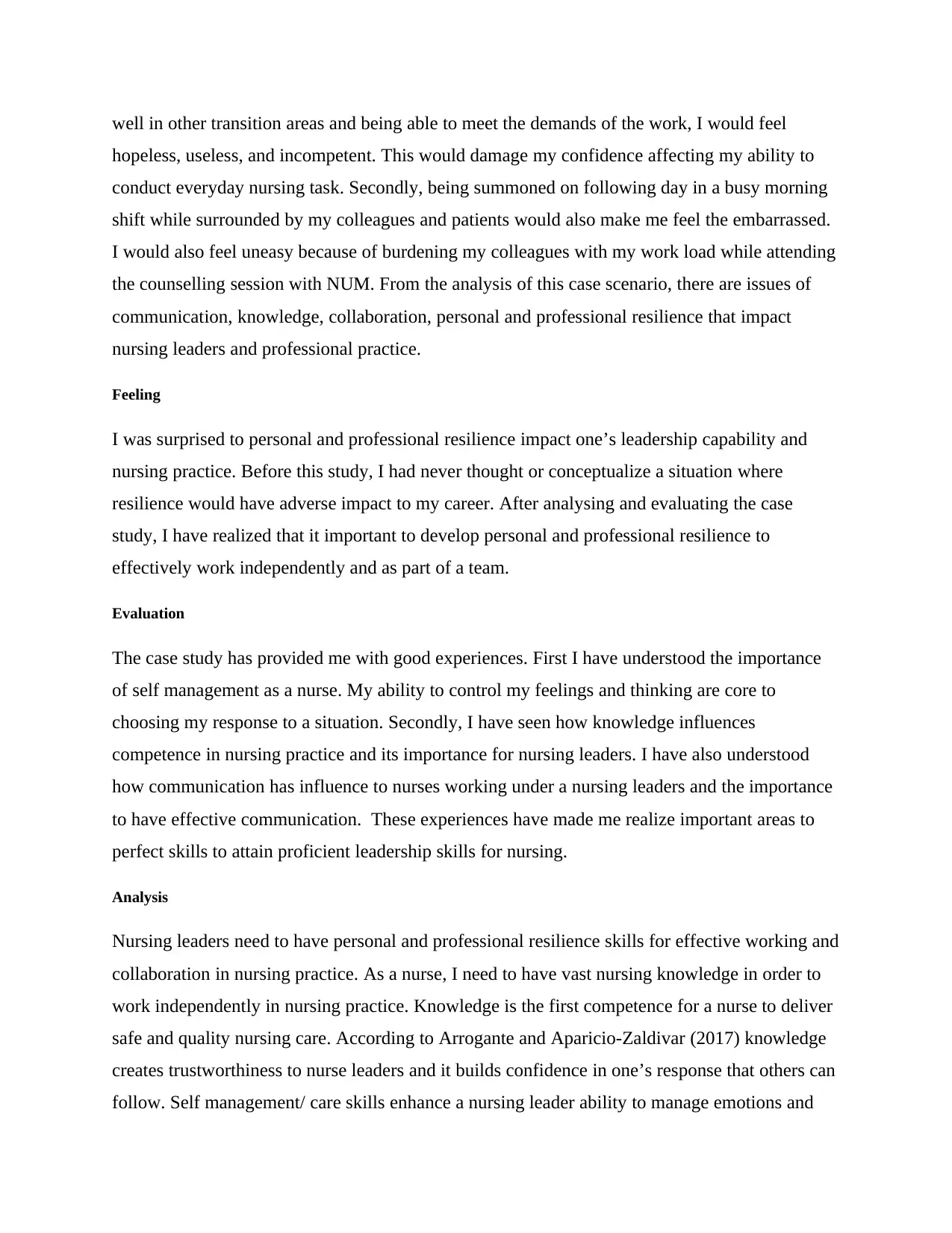
well in other transition areas and being able to meet the demands of the work, I would feel
hopeless, useless, and incompetent. This would damage my confidence affecting my ability to
conduct everyday nursing task. Secondly, being summoned on following day in a busy morning
shift while surrounded by my colleagues and patients would also make me feel the embarrassed.
I would also feel uneasy because of burdening my colleagues with my work load while attending
the counselling session with NUM. From the analysis of this case scenario, there are issues of
communication, knowledge, collaboration, personal and professional resilience that impact
nursing leaders and professional practice.
Feeling
I was surprised to personal and professional resilience impact one’s leadership capability and
nursing practice. Before this study, I had never thought or conceptualize a situation where
resilience would have adverse impact to my career. After analysing and evaluating the case
study, I have realized that it important to develop personal and professional resilience to
effectively work independently and as part of a team.
Evaluation
The case study has provided me with good experiences. First I have understood the importance
of self management as a nurse. My ability to control my feelings and thinking are core to
choosing my response to a situation. Secondly, I have seen how knowledge influences
competence in nursing practice and its importance for nursing leaders. I have also understood
how communication has influence to nurses working under a nursing leaders and the importance
to have effective communication. These experiences have made me realize important areas to
perfect skills to attain proficient leadership skills for nursing.
Analysis
Nursing leaders need to have personal and professional resilience skills for effective working and
collaboration in nursing practice. As a nurse, I need to have vast nursing knowledge in order to
work independently in nursing practice. Knowledge is the first competence for a nurse to deliver
safe and quality nursing care. According to Arrogante and Aparicio-Zaldivar (2017) knowledge
creates trustworthiness to nurse leaders and it builds confidence in one’s response that others can
follow. Self management/ care skills enhance a nursing leader ability to manage emotions and
hopeless, useless, and incompetent. This would damage my confidence affecting my ability to
conduct everyday nursing task. Secondly, being summoned on following day in a busy morning
shift while surrounded by my colleagues and patients would also make me feel the embarrassed.
I would also feel uneasy because of burdening my colleagues with my work load while attending
the counselling session with NUM. From the analysis of this case scenario, there are issues of
communication, knowledge, collaboration, personal and professional resilience that impact
nursing leaders and professional practice.
Feeling
I was surprised to personal and professional resilience impact one’s leadership capability and
nursing practice. Before this study, I had never thought or conceptualize a situation where
resilience would have adverse impact to my career. After analysing and evaluating the case
study, I have realized that it important to develop personal and professional resilience to
effectively work independently and as part of a team.
Evaluation
The case study has provided me with good experiences. First I have understood the importance
of self management as a nurse. My ability to control my feelings and thinking are core to
choosing my response to a situation. Secondly, I have seen how knowledge influences
competence in nursing practice and its importance for nursing leaders. I have also understood
how communication has influence to nurses working under a nursing leaders and the importance
to have effective communication. These experiences have made me realize important areas to
perfect skills to attain proficient leadership skills for nursing.
Analysis
Nursing leaders need to have personal and professional resilience skills for effective working and
collaboration in nursing practice. As a nurse, I need to have vast nursing knowledge in order to
work independently in nursing practice. Knowledge is the first competence for a nurse to deliver
safe and quality nursing care. According to Arrogante and Aparicio-Zaldivar (2017) knowledge
creates trustworthiness to nurse leaders and it builds confidence in one’s response that others can
follow. Self management/ care skills enhance a nursing leader ability to manage emotions and
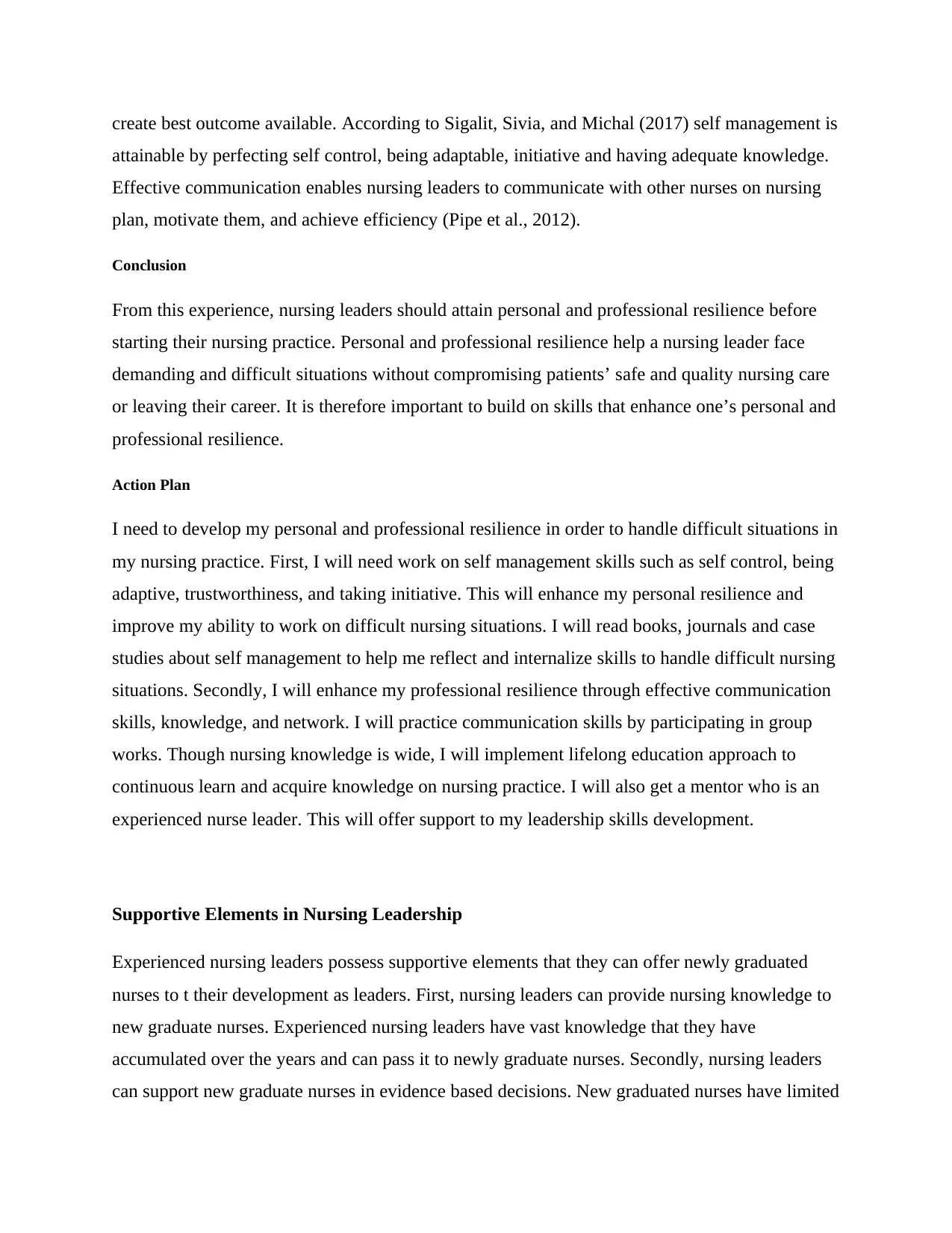
create best outcome available. According to Sigalit, Sivia, and Michal (2017) self management is
attainable by perfecting self control, being adaptable, initiative and having adequate knowledge.
Effective communication enables nursing leaders to communicate with other nurses on nursing
plan, motivate them, and achieve efficiency (Pipe et al., 2012).
Conclusion
From this experience, nursing leaders should attain personal and professional resilience before
starting their nursing practice. Personal and professional resilience help a nursing leader face
demanding and difficult situations without compromising patients’ safe and quality nursing care
or leaving their career. It is therefore important to build on skills that enhance one’s personal and
professional resilience.
Action Plan
I need to develop my personal and professional resilience in order to handle difficult situations in
my nursing practice. First, I will need work on self management skills such as self control, being
adaptive, trustworthiness, and taking initiative. This will enhance my personal resilience and
improve my ability to work on difficult nursing situations. I will read books, journals and case
studies about self management to help me reflect and internalize skills to handle difficult nursing
situations. Secondly, I will enhance my professional resilience through effective communication
skills, knowledge, and network. I will practice communication skills by participating in group
works. Though nursing knowledge is wide, I will implement lifelong education approach to
continuous learn and acquire knowledge on nursing practice. I will also get a mentor who is an
experienced nurse leader. This will offer support to my leadership skills development.
Supportive Elements in Nursing Leadership
Experienced nursing leaders possess supportive elements that they can offer newly graduated
nurses to t their development as leaders. First, nursing leaders can provide nursing knowledge to
new graduate nurses. Experienced nursing leaders have vast knowledge that they have
accumulated over the years and can pass it to newly graduate nurses. Secondly, nursing leaders
can support new graduate nurses in evidence based decisions. New graduated nurses have limited
attainable by perfecting self control, being adaptable, initiative and having adequate knowledge.
Effective communication enables nursing leaders to communicate with other nurses on nursing
plan, motivate them, and achieve efficiency (Pipe et al., 2012).
Conclusion
From this experience, nursing leaders should attain personal and professional resilience before
starting their nursing practice. Personal and professional resilience help a nursing leader face
demanding and difficult situations without compromising patients’ safe and quality nursing care
or leaving their career. It is therefore important to build on skills that enhance one’s personal and
professional resilience.
Action Plan
I need to develop my personal and professional resilience in order to handle difficult situations in
my nursing practice. First, I will need work on self management skills such as self control, being
adaptive, trustworthiness, and taking initiative. This will enhance my personal resilience and
improve my ability to work on difficult nursing situations. I will read books, journals and case
studies about self management to help me reflect and internalize skills to handle difficult nursing
situations. Secondly, I will enhance my professional resilience through effective communication
skills, knowledge, and network. I will practice communication skills by participating in group
works. Though nursing knowledge is wide, I will implement lifelong education approach to
continuous learn and acquire knowledge on nursing practice. I will also get a mentor who is an
experienced nurse leader. This will offer support to my leadership skills development.
Supportive Elements in Nursing Leadership
Experienced nursing leaders possess supportive elements that they can offer newly graduated
nurses to t their development as leaders. First, nursing leaders can provide nursing knowledge to
new graduate nurses. Experienced nursing leaders have vast knowledge that they have
accumulated over the years and can pass it to newly graduate nurses. Secondly, nursing leaders
can support new graduate nurses in evidence based decisions. New graduated nurses have limited
⊘ This is a preview!⊘
Do you want full access?
Subscribe today to unlock all pages.

Trusted by 1+ million students worldwide
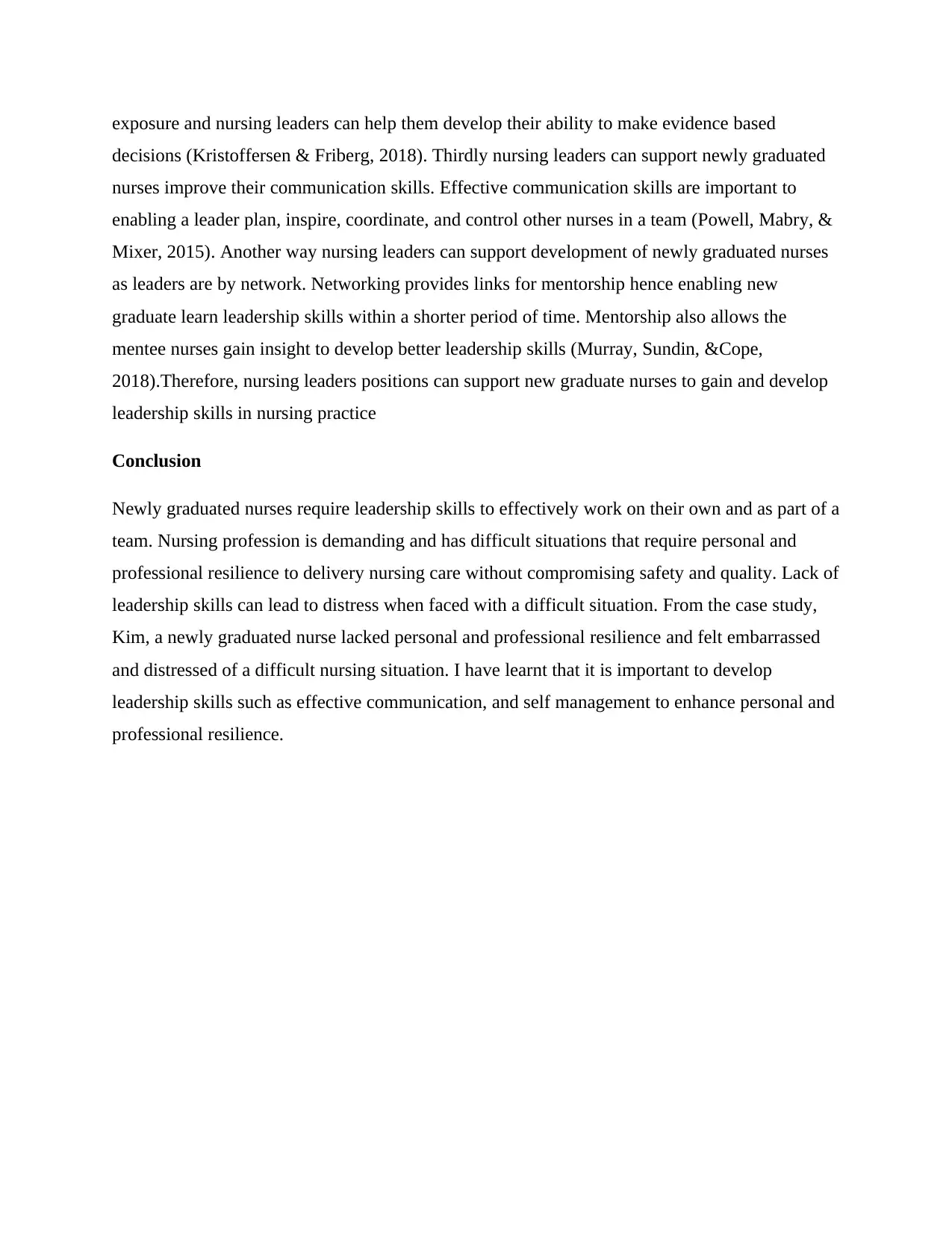
exposure and nursing leaders can help them develop their ability to make evidence based
decisions (Kristoffersen & Friberg, 2018). Thirdly nursing leaders can support newly graduated
nurses improve their communication skills. Effective communication skills are important to
enabling a leader plan, inspire, coordinate, and control other nurses in a team (Powell, Mabry, &
Mixer, 2015). Another way nursing leaders can support development of newly graduated nurses
as leaders are by network. Networking provides links for mentorship hence enabling new
graduate learn leadership skills within a shorter period of time. Mentorship also allows the
mentee nurses gain insight to develop better leadership skills (Murray, Sundin, &Cope,
2018).Therefore, nursing leaders positions can support new graduate nurses to gain and develop
leadership skills in nursing practice
Conclusion
Newly graduated nurses require leadership skills to effectively work on their own and as part of a
team. Nursing profession is demanding and has difficult situations that require personal and
professional resilience to delivery nursing care without compromising safety and quality. Lack of
leadership skills can lead to distress when faced with a difficult situation. From the case study,
Kim, a newly graduated nurse lacked personal and professional resilience and felt embarrassed
and distressed of a difficult nursing situation. I have learnt that it is important to develop
leadership skills such as effective communication, and self management to enhance personal and
professional resilience.
decisions (Kristoffersen & Friberg, 2018). Thirdly nursing leaders can support newly graduated
nurses improve their communication skills. Effective communication skills are important to
enabling a leader plan, inspire, coordinate, and control other nurses in a team (Powell, Mabry, &
Mixer, 2015). Another way nursing leaders can support development of newly graduated nurses
as leaders are by network. Networking provides links for mentorship hence enabling new
graduate learn leadership skills within a shorter period of time. Mentorship also allows the
mentee nurses gain insight to develop better leadership skills (Murray, Sundin, &Cope,
2018).Therefore, nursing leaders positions can support new graduate nurses to gain and develop
leadership skills in nursing practice
Conclusion
Newly graduated nurses require leadership skills to effectively work on their own and as part of a
team. Nursing profession is demanding and has difficult situations that require personal and
professional resilience to delivery nursing care without compromising safety and quality. Lack of
leadership skills can lead to distress when faced with a difficult situation. From the case study,
Kim, a newly graduated nurse lacked personal and professional resilience and felt embarrassed
and distressed of a difficult nursing situation. I have learnt that it is important to develop
leadership skills such as effective communication, and self management to enhance personal and
professional resilience.
Paraphrase This Document
Need a fresh take? Get an instant paraphrase of this document with our AI Paraphraser
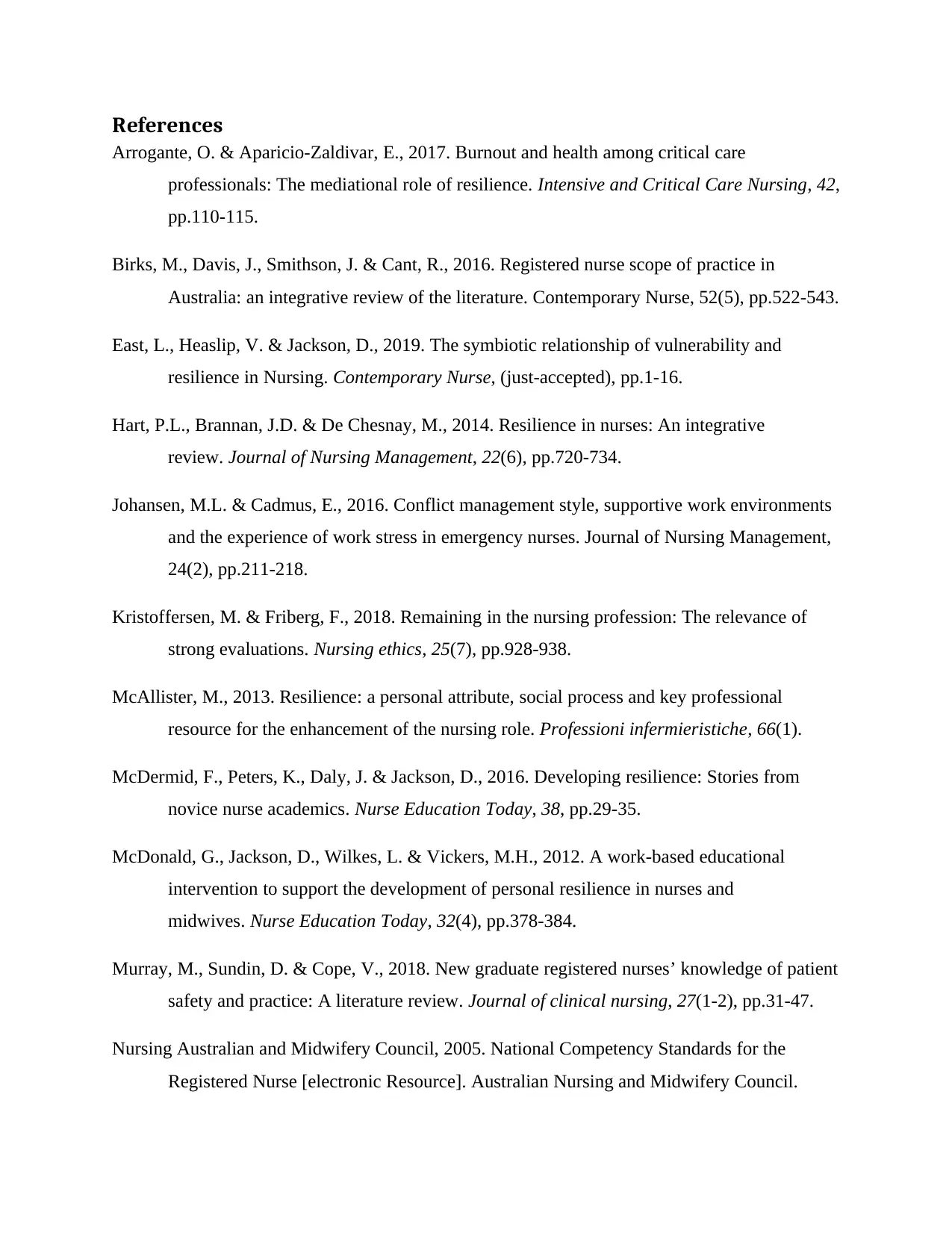
References
Arrogante, O. & Aparicio-Zaldivar, E., 2017. Burnout and health among critical care
professionals: The mediational role of resilience. Intensive and Critical Care Nursing, 42,
pp.110-115.
Birks, M., Davis, J., Smithson, J. & Cant, R., 2016. Registered nurse scope of practice in
Australia: an integrative review of the literature. Contemporary Nurse, 52(5), pp.522-543.
East, L., Heaslip, V. & Jackson, D., 2019. The symbiotic relationship of vulnerability and
resilience in Nursing. Contemporary Nurse, (just-accepted), pp.1-16.
Hart, P.L., Brannan, J.D. & De Chesnay, M., 2014. Resilience in nurses: An integrative
review. Journal of Nursing Management, 22(6), pp.720-734.
Johansen, M.L. & Cadmus, E., 2016. Conflict management style, supportive work environments
and the experience of work stress in emergency nurses. Journal of Nursing Management,
24(2), pp.211-218.
Kristoffersen, M. & Friberg, F., 2018. Remaining in the nursing profession: The relevance of
strong evaluations. Nursing ethics, 25(7), pp.928-938.
McAllister, M., 2013. Resilience: a personal attribute, social process and key professional
resource for the enhancement of the nursing role. Professioni infermieristiche, 66(1).
McDermid, F., Peters, K., Daly, J. & Jackson, D., 2016. Developing resilience: Stories from
novice nurse academics. Nurse Education Today, 38, pp.29-35.
McDonald, G., Jackson, D., Wilkes, L. & Vickers, M.H., 2012. A work-based educational
intervention to support the development of personal resilience in nurses and
midwives. Nurse Education Today, 32(4), pp.378-384.
Murray, M., Sundin, D. & Cope, V., 2018. New graduate registered nurses’ knowledge of patient
safety and practice: A literature review. Journal of clinical nursing, 27(1-2), pp.31-47.
Nursing Australian and Midwifery Council, 2005. National Competency Standards for the
Registered Nurse [electronic Resource]. Australian Nursing and Midwifery Council.
Arrogante, O. & Aparicio-Zaldivar, E., 2017. Burnout and health among critical care
professionals: The mediational role of resilience. Intensive and Critical Care Nursing, 42,
pp.110-115.
Birks, M., Davis, J., Smithson, J. & Cant, R., 2016. Registered nurse scope of practice in
Australia: an integrative review of the literature. Contemporary Nurse, 52(5), pp.522-543.
East, L., Heaslip, V. & Jackson, D., 2019. The symbiotic relationship of vulnerability and
resilience in Nursing. Contemporary Nurse, (just-accepted), pp.1-16.
Hart, P.L., Brannan, J.D. & De Chesnay, M., 2014. Resilience in nurses: An integrative
review. Journal of Nursing Management, 22(6), pp.720-734.
Johansen, M.L. & Cadmus, E., 2016. Conflict management style, supportive work environments
and the experience of work stress in emergency nurses. Journal of Nursing Management,
24(2), pp.211-218.
Kristoffersen, M. & Friberg, F., 2018. Remaining in the nursing profession: The relevance of
strong evaluations. Nursing ethics, 25(7), pp.928-938.
McAllister, M., 2013. Resilience: a personal attribute, social process and key professional
resource for the enhancement of the nursing role. Professioni infermieristiche, 66(1).
McDermid, F., Peters, K., Daly, J. & Jackson, D., 2016. Developing resilience: Stories from
novice nurse academics. Nurse Education Today, 38, pp.29-35.
McDonald, G., Jackson, D., Wilkes, L. & Vickers, M.H., 2012. A work-based educational
intervention to support the development of personal resilience in nurses and
midwives. Nurse Education Today, 32(4), pp.378-384.
Murray, M., Sundin, D. & Cope, V., 2018. New graduate registered nurses’ knowledge of patient
safety and practice: A literature review. Journal of clinical nursing, 27(1-2), pp.31-47.
Nursing Australian and Midwifery Council, 2005. National Competency Standards for the
Registered Nurse [electronic Resource]. Australian Nursing and Midwifery Council.
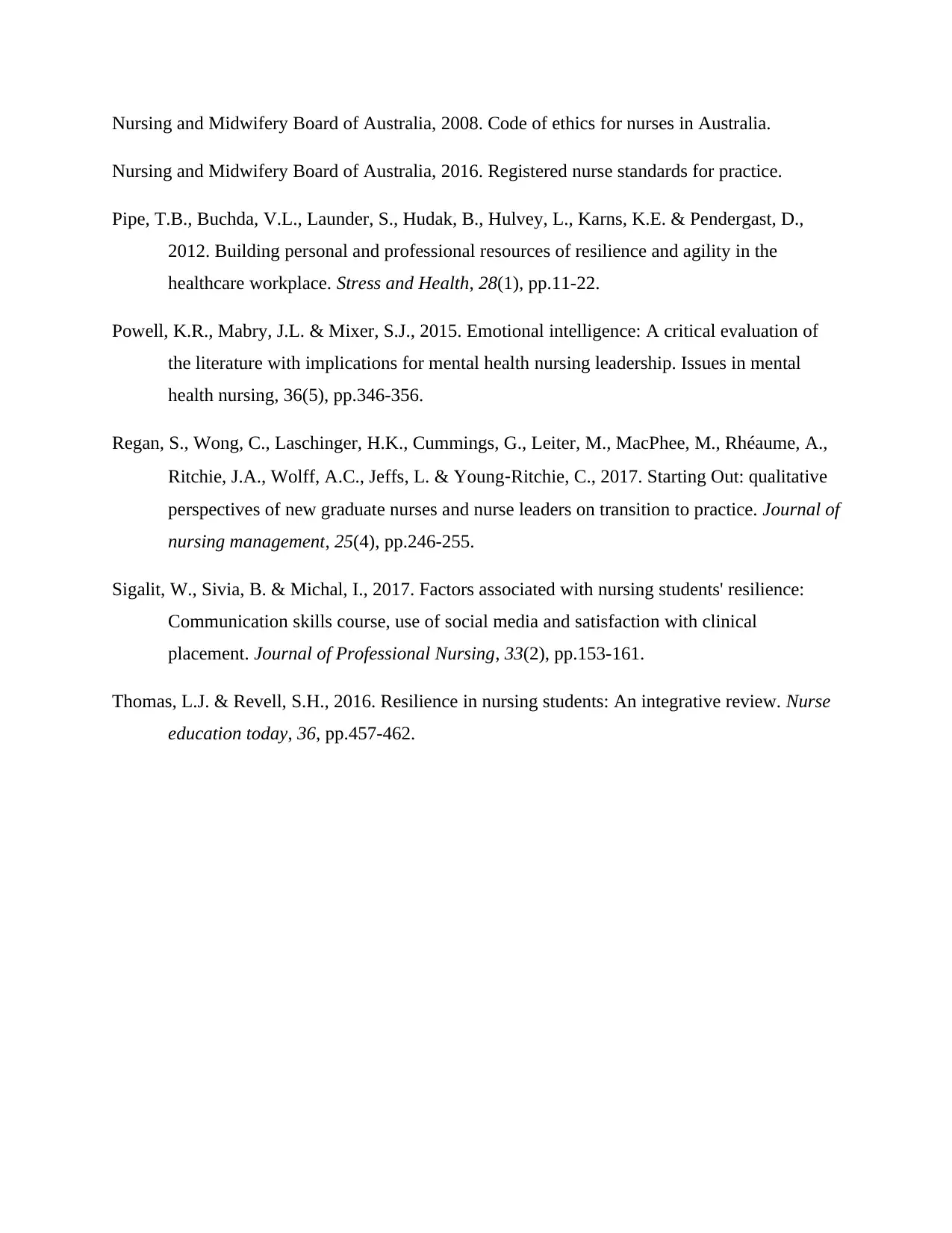
Nursing and Midwifery Board of Australia, 2008. Code of ethics for nurses in Australia.
Nursing and Midwifery Board of Australia, 2016. Registered nurse standards for practice.
Pipe, T.B., Buchda, V.L., Launder, S., Hudak, B., Hulvey, L., Karns, K.E. & Pendergast, D.,
2012. Building personal and professional resources of resilience and agility in the
healthcare workplace. Stress and Health, 28(1), pp.11-22.
Powell, K.R., Mabry, J.L. & Mixer, S.J., 2015. Emotional intelligence: A critical evaluation of
the literature with implications for mental health nursing leadership. Issues in mental
health nursing, 36(5), pp.346-356.
Regan, S., Wong, C., Laschinger, H.K., Cummings, G., Leiter, M., MacPhee, M., Rhéaume, A.,
Ritchie, J.A., Wolff, A.C., Jeffs, L. & Young‐Ritchie, C., 2017. Starting Out: qualitative
perspectives of new graduate nurses and nurse leaders on transition to practice. Journal of
nursing management, 25(4), pp.246-255.
Sigalit, W., Sivia, B. & Michal, I., 2017. Factors associated with nursing students' resilience:
Communication skills course, use of social media and satisfaction with clinical
placement. Journal of Professional Nursing, 33(2), pp.153-161.
Thomas, L.J. & Revell, S.H., 2016. Resilience in nursing students: An integrative review. Nurse
education today, 36, pp.457-462.
Nursing and Midwifery Board of Australia, 2016. Registered nurse standards for practice.
Pipe, T.B., Buchda, V.L., Launder, S., Hudak, B., Hulvey, L., Karns, K.E. & Pendergast, D.,
2012. Building personal and professional resources of resilience and agility in the
healthcare workplace. Stress and Health, 28(1), pp.11-22.
Powell, K.R., Mabry, J.L. & Mixer, S.J., 2015. Emotional intelligence: A critical evaluation of
the literature with implications for mental health nursing leadership. Issues in mental
health nursing, 36(5), pp.346-356.
Regan, S., Wong, C., Laschinger, H.K., Cummings, G., Leiter, M., MacPhee, M., Rhéaume, A.,
Ritchie, J.A., Wolff, A.C., Jeffs, L. & Young‐Ritchie, C., 2017. Starting Out: qualitative
perspectives of new graduate nurses and nurse leaders on transition to practice. Journal of
nursing management, 25(4), pp.246-255.
Sigalit, W., Sivia, B. & Michal, I., 2017. Factors associated with nursing students' resilience:
Communication skills course, use of social media and satisfaction with clinical
placement. Journal of Professional Nursing, 33(2), pp.153-161.
Thomas, L.J. & Revell, S.H., 2016. Resilience in nursing students: An integrative review. Nurse
education today, 36, pp.457-462.
⊘ This is a preview!⊘
Do you want full access?
Subscribe today to unlock all pages.

Trusted by 1+ million students worldwide
1 out of 9
Related Documents
Your All-in-One AI-Powered Toolkit for Academic Success.
+13062052269
info@desklib.com
Available 24*7 on WhatsApp / Email
![[object Object]](/_next/static/media/star-bottom.7253800d.svg)
Unlock your academic potential
Copyright © 2020–2026 A2Z Services. All Rights Reserved. Developed and managed by ZUCOL.





